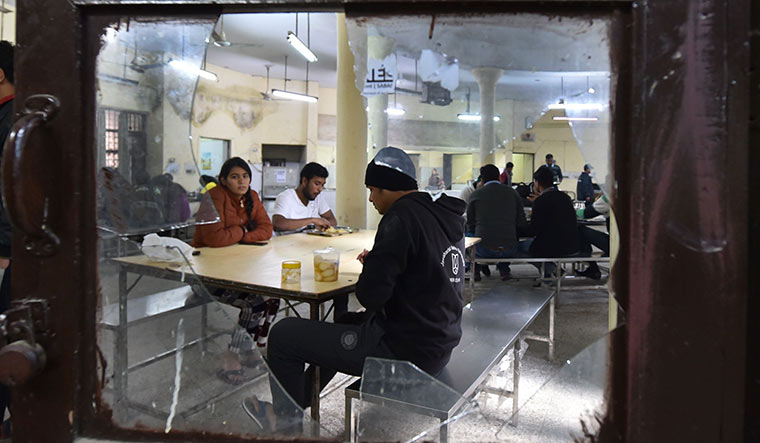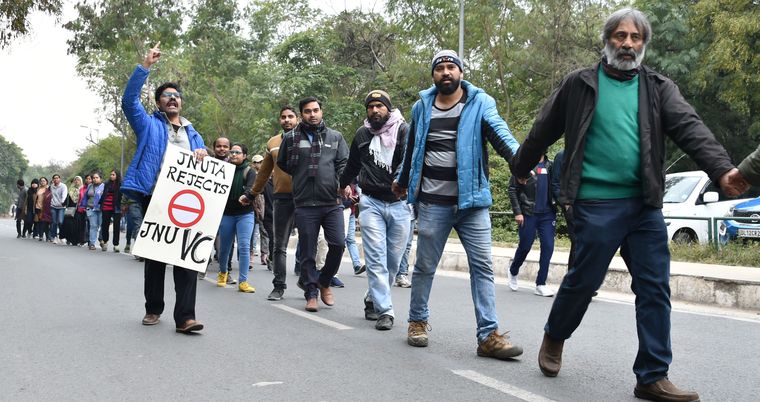FROM HER WHEELCHAIR, she saw a hail of bricks, legs being pounded by rods, glass panes being smashed into smithereens. Ruby Singh, a ground-floor resident of the Sabarmati hostel in the Jawaharlal Nehru University, was a witness to the violence a group of masked persons unleashed on the night of January 5. “On all three floors of the boys’ wing, the goons went from room to room, threatening students with blows if they couldn’t prove their political affiliation,” said Ruby, a final-year PhD student at the Centre for Russian and Central Asian Studies. “My classmate was let off only after he grabbed a book on nationalism and swore his allegiance to ABVP (Akhil Bharatiya Vidyarthi Parishad).”
That night, the girls in the hostel shielded Ruby from the rampaging mob armed with sledgehammers and metal rods. Her neighbours have since told her to lock her doors at night. Her parents in Lucknow are also anxious. “I have heard that some unidentified men are still roaming the campus,” said Ruby. “Let them come again, we will also beat them up. We girls here have bricks and stones for self-defence.”
Just then, a passing guard asked her to come eat dal chawal. Ruby was hungry. Her last meal was her lunch the previous day, on January 5. “The mess was ransacked and the goons took away the provisions. Even the security guard was hospitalised,” said the guard. The back of his blue jacket was emblazoned with the word Cyclops—a new security force the JNU administration hired four months ago, consisting mostly of former Army personnel. The guard’s colleague added with a grin, “I thought I heard the guard wasn’t even on duty yesterday, and now he is in hospital?”
The immediate trigger for the violence on January 5 can be traced to a series of scuffles between the left-backed JNU Students’ Union and the RSS-controlled ABVP over registration for the new winter semester. The university has been on the boil for more than eight weeks over a hike in hostel fees. But what happened on January 5 exposed the larger forces of militarisation at play in Indian politics today. Anyone with a passing awareness of JNU’s vibrant history of dissent will know that the campus is the very antithesis of homogeneity and hierarchy. It believes in intellectual sparring and the battle of ideas. It stands for the critical youth. In a March 2018 paper titled Diversity, Democracy, and Dissent: A Study on Student Politics at JNU, the authors surveyed 70,000 pamphlets issued by political outfits throughout the history of JNU. The authors noted that the word “against” was the most used word, appearing 55,298 times, stressing the point that JNU’s state of mind has always been “anti-establishment”. Why then was a regular protest disrupted with such vengeance that Sunday evening?
At stake is the very idea of a public university. “You think students are merely fighting raised hostel fees? If you dig deeper, you will know it is a fight for an affordable, good quality public education and to retain the tradition of heterogeneity,” said Professor Avijit Pathak, who teaches at the School of Social Sciences in JNU, and has lived on campus for 30 years. “The battle is for restoring the idea of a public university where a dalit boy from Maharashtra, a tribal boy from the hinterlands of Chhattisgarh and the metropolitan young from Kolkata or Delhi feel equally at home. This heterogeneity has generated a lot of sensitivity and democratic sensibility in the campus.”
Pathak said he had not seen such a vicious muzzling of dissent on campus even during the Emergency. He points to the global rise of majoritarian politics. “In recent times, the aggression, the celebration of it, the metaphor of the surgical strike in every sphere of life has invaded our consciousness. You look at the rape case in Hyderabad and the police encounter after that; the way some celebrities endorsed it; the violence at Jamia and AMU (Aligarh Muslim University) campuses. As a collective, we have internalised the logic of brute force and violence. We have a political regime which reconciles both neoliberal market-driven discourse and a version of a hyper-masculine militant religious nationalism. That is the genesis of the problem in a larger context.”
A historical precedent resonates in Pathak’s mind: At the University of Frankfurt in the 1930s, a group of scholars specialising in Marxist studies at the Institute for Social Research were exiled when Adolf Hitler came to power. They could not return from the US till his rule was over.
But the student community in JNU is no mood to leave or get intimidated. Chitra, a third-year PhD student in the sociology department, said she cannot forget the image of the fawda (spade) from January 5. Chitra had also spotted Komal Sharma, alleged to be one of the female assailants on Sunday, at the intersection near the SBI signboard on the campus. Chitra had followed her when she sniffed something fishy, but lost her in a melee. The following day, she saw a screenshot of Komal’s Facebook profile going viral, linking her with the ABVP. “I am ready to file a police complaint if no one is going to take any action,” said Chitra.
Venkat Choubey, the ABVP candidate for joint secretary at the students’ union elections in 2018, said he was scared for his life and was hiding outside the campus. He said he did not know any Komal Sharma and put the blame squarely on JNUSU members and “elements from Jamia”. “Go and see the Periyar hostel,” he said. “It’s completely empty. The JNUSU people beat up students in that hostel on Sunday because they know it is a bastion of the ABVP. Jihadis from Jamia had come that day. They are uneducated. They will kill people. I am afraid, and I am not staying on campus.”
He insisted that he was not an Islamophobe, but he had seen students from Jamia with kattas (country-made pistols) outside the JNU main gate.
He said the university had changed. “Now nobody wants to read and talk,” he huffed on the phone. “The left’s own comrades don’t know the Communist Manifesto. They don’t know the difference between Marxism and socialism. Some senior activist sits with them over tea; that is their lesson in Marxism.”
Vice Chancellor Jagadesh Kumar, the most anti-dialogue VC in JNU’s history, has now extended a fig leaf of ‘let bygones be bygones’. A fringe outfit, the Hindu Raksha Dal, has taken responsibility for beating up “anti-nationals”. The Delhi Police will submit a fact-finding report to the home ministry after investigation. But JNUSU is adamant in its demand. JNUSU vice president Saket Moon said, “Peace and normalcy will only return to the campus with the resignation of the current VC.” On January 8, JNUSU president Aishe Ghosh filed an attempt to murder complaint with the police.
Said Amit Singh, a JNU alumnus and assistant professor at Ambedkar University in Delhi: “In our wildest imagination, we could not have imagined this kind of a violence.” The police had struck his friend, a JNU student, on her leg with lathis when she tried to make videos of the carnage at the Sabarmati hostel right after the mob had dispersed on January 5. The police even smashed her phone. “Earlier, if two students fought, irrespective of ideology, both were penalised as the campus had a policy of zero tolerance to violence,” said Amit. “Earlier, there was some kind of a moral hold on all people. Today, ABVP activists are getting stupidly stubborn because of the support they have. They have a wrong impression of being empowered. They are not bothered about higher education. The moral hold they had on each other is gone.”
Amit, however, does not think JNU’s illustrious tradition of resistance is threatened. “This is not a permanent dent,” he said. “Democratic forces are much stronger. JNU is very resilient. The strongest emperors and dictators have not been able to outlast the unity of students’ struggle.”



